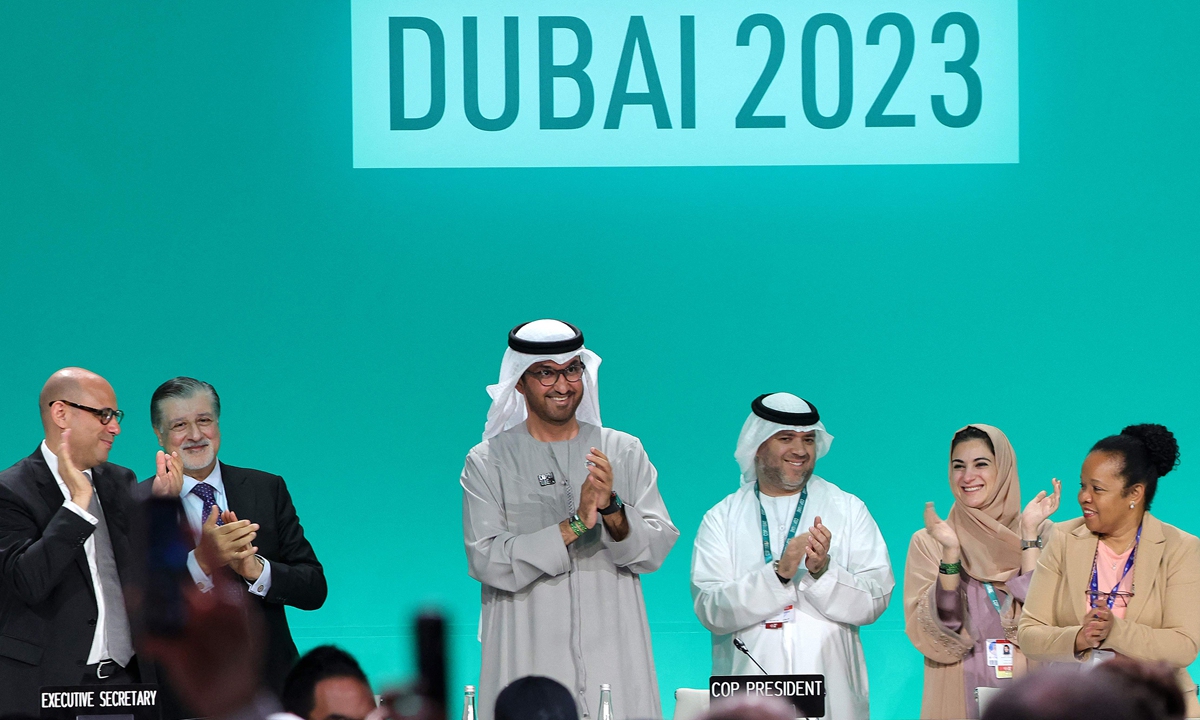
COP28 President Sultan Ahmed Al Jaber (center) applauds along with other officials before a plenary session during the United Nations climate summit in Dubai on December 13, 2023. Nations adopted the first ever UN climate deal that calls for the world to transition away from fossil fuels on the day. Photo: VCG
Countries finally agreed, for the first time, to transition away from fossil fuels in Dubai on Wednesday to avert the worst effects of climate change after clashing over whether to include the wording "phase out of fossil fuels" in previous drafts. Observers at the UN COP28 climate summit called the hard-earned deal, which is a result of compromise by all parties, a milestone after the 2015 Paris Agreement as it reflects greater global identification in a gradual energy transition away from fossil fuel.
The global stocktake text has been adopted, with no objections, and the room burst into applause, as COP28 President Sultan Ahmed Al Jaber gaveled through the agreement, the Guardian reported as the landmark proposal was finally adopted on a plenary session which started at 9:30 am on Wednesday local time, ending the two weeks of tough negotiations that ran a day into overtime.
The draft called for "Transitioning away from fossil fuels in our energy systems, beginning in this decade, in a just, orderly and equitable manner so as to achieve net zero by 2050 in keeping with the science" and "Rapidly phasing down unabated coal," a compromise made by all parties over the phase-out of fossil fuels.
While the US, the EU and small island nations were among those demanding a commitment to phase out coal, oil and gas, this was rejected by oil-rich nations including Saudi Arabia and Russia. China's special envoy for climate change Xie Zhenhua said China wanted a version which reflected inclusiveness to the utmost extent and is acceptable to all parties.
"Whilst we didn't turn the page on the fossil fuel era in Dubai, this outcome is the beginning of the end," said UN Climate Change Executive Secretary Simon Stiell in his closing remarks sent to the Global Times on Wednesday.
China has taken an active part in the discussion and negotiation on all the agenda items, said Chinese Foreign Ministry spokesperson Mao Ning at a Wednesday press conference when asked China's position on the text of the final deal.
"We hope the outcomes of this meeting will contribute to the full and effective implementation of the Paris Agreement and lend more support to developing countries' efforts to realize energy transition and better cope with climate change," Mao said.
Besides the hotspot fossil fuel issue, Stiell said COP28 delivered some genuine strides forward, including tripling renewables and doubling energy efficiency, a framework for the Global Goal on Adaptation, as well as operationalizing the loss and damage fund, and making an initial down payment.
Experts said COP28 is another step forward after the Paris Agreement, not least because its deal more greatly identifies with the general direction of the energy transition away from fossil fuel.
Ma Jun, director of the Beijing-based Institute of Public and Environmental Affairs, who was attending COP28 as an invited observer from December 1 to 9 in Dubai, told the Global Times on Wednesday that he believes the biggest consensus was in boosting renewable energy as the deal reads "Tripling renewable energy capacity globally and doubling the global average annual rate of energy efficiency improvements by 2030."
Ma said that many countries, including both developed and developing countries, realized during COP28 the need to cooperate with China in terms of equipment and technology to promote renewable energy development.
Currently, China is leading global efforts to shift to cleaner energy sources, with robust development in its wind and photovoltaic power industries. It supplies 50 percent of wind power equipment and 80 percent of photovoltaic module equipment in the world. As of June 2023, its sales of new energy vehicles consistently ranked first globally.




